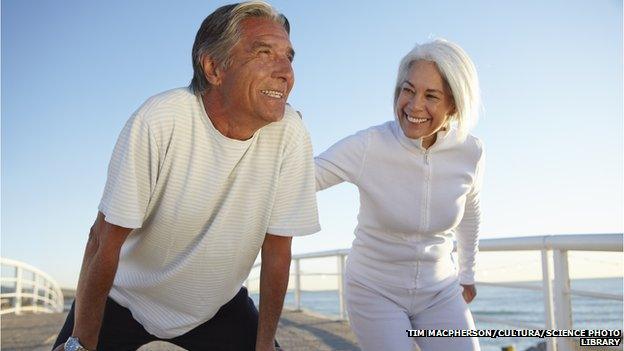Fitness 'rubs off on your partner'
- Published

Whether you want to lose weight, quit smoking or exercise more, you have a better chance of success if your partner shares your goal, research suggests.
The British study looked at data from more than 3,700 married or cohabiting couples aged 50 and older.
Men and women were three times or more likely to achieve their resolution when their partner joined in the challenge.
Experts say campaigns could capitalise on this "rubbing off" effect.
The study did not look at whether unhealthy partners might drag someone down.
Joint effort
Many studies suggest that our partners can have a big influence on our behaviour and our health.
Happily married or cohabiting people appear to have a lower risk of heart disease, external and better cancer outcomes, for example.
But it is not clear whether this is because people mirror their partners' good behaviour or because we tend to pair off with people who are similarly healthy or unhealthy to us.
The latest study in Jama Internal Medicine set out to investigate this.
The University College London team selected men and women who were in a cohabiting relationship and who had unhealthy behaviours - either being a smoker, being overweight or doing too little exercise - at the start of the study.
The researchers tracked the behaviours of these individuals and their partners over four years, noting if any of them quit smoking, lost weight or became more active.

They found that when one half of the couple changed to a healthier lifestyle, the other person was more likely to make a similar lifestyle change.
Seeing an unhealthy partner make a change provided the biggest impetus for an individual to do the same, but living with someone already healthier than themselves also appeared to act as an encouragement.
For example, a smoker was twice as likely to quit if their partner was a non-smoker but 10 times more likely to quit if their partner smoked but decided to quit too.
Similarly, living with a sporty partner prompted individuals to get active, but not as much as seeing a loved one change from a couch potato to an active lifestyle.
Researcher Dr Sarah Jackson said the findings could help inform public health campaigns.
"This is important because it shows that if you can target couples or encourage people to involve their partners they may be more likely to succeed. Having the support of someone close seems to help."
The government's Change4Life campaign focuses on getting whole families to be more active and eat healthily, but other campaigns have focused on the individual.
Dr Mike Knapton, from the British Heart Foundation which part-funded Dr Jackson's work, said: "This is an interesting study and reinforces the notion that your relationships play a key role in your health."
Dr Julie Sharp, Cancer Research UK's head of health information, said getting support could help people take up good habits.
"For example, if you want to lose weight and have a friend or colleague who's trying to do the same thing, you could encourage each other by joining up for a run or a swim at lunchtime or after work. And local support such as stop smoking services are very effective at helping people to quit.
"Keeping healthy by not smoking, maintaining a healthy body weight and being active can all lower the risk of cancer, and the more people can help and encourage each other, the better."
- Published28 May 2014

- Published26 December 2014
